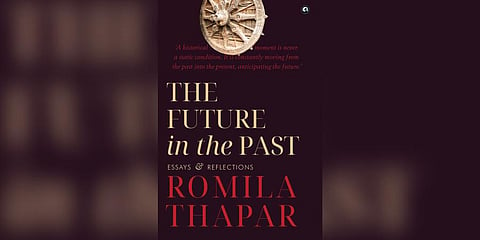

The name Romila Thapar evokes a sense of affinity for those who encountered her works in their history textbooks during their school years. During that time, the more one delved into Thapar’s writings, the more one appreciated her engaging and nuanced style of argumentation, skillfully presenting complex subjects. Childhood memories, however, can distort reality, creating an illusion of vast spaces and infallible individuals.
The more one read other historians, the more one realised that Thapar’s perspective tends to employ a certain naïve empiricism. What also comes as a surprise is the sweeping generalisation because of the Orientalist paradigm perpetuated in the name of mainstream academic discourse.
In her latest collection, The Future in the Past: Essays & Reflections, Thapar brings a historian’s perspective to analyse a range of topics from museums and the role of patronage to the search for a national language, and seeks to provide answers to oft raised questions such as, ‘Which of us are Aryans?’ As always, Thapar’s prose is highly readable, her tone conversationalist, and she employs connections, albeit highly selective, between the past and present to make a case for how current debates have roots in older traditions.
But her brand of history has always been lopsided, to the extent that anything contrarian ought not to be acknowledged. For instance, in the past, Thapar and other ‘eminent historians’ staunchly advocated the Aryan invasion theory, disregarding contradictory evidence.
The author, along with fellow historians such as Harbans Mukhia and Bipan Chandra, authored a booklet, Communalism and the Writing of Indian History (1969), where the notion that not only Islamic invaders but also Hindu kings would despoil temples; A few decades later, this became the standard accepted argument. Surprisingly, in the 1990s, an American researcher reached out to Thapar only to find out that even after five decades, the historian could not give any documentation to support the claim. This is an excellent example of what Arun Shourie wrote in Eminent Historians, “Maybe, perhaps, probably mostly… therefore.”
Such understanding of the past often relies on the prejudices of the present, and Thapar’s somewhat reductionist approach is displayed–– “…the new Hinduism, currently propagated by the sanghs, parishads and samajs, is an attempt to reshape indigenous religions into a monolithic, uniform faith.”
Moving with the times, Thapar does not seem to support the Aryan invasion notion any longer. This, however, prompts the question: Shouldn’t the realisation that past ideas, once fervently propagated and upheld, have been proven wrong, encourage us to re-evaluate our perspectives or acknowledge that the ‘other side’ also holds a place? In other words, despite the eloquence of Thapar’s treatise and its eminently readable nature, it presents a one-sided argument.